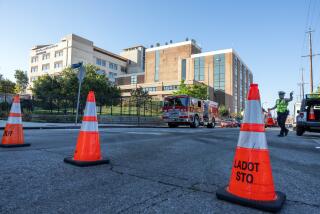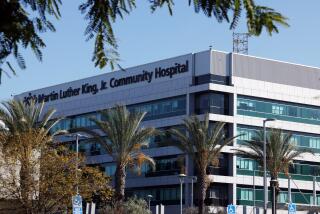King/Drew at a Critical Point
- Share via
The Martin Luther King Jr./Drew Medical Center lost national accreditation last week. Although far from good news, it’s not the worst.
The accrediting agency yanked its seal of approval because of serious lapses in medical care found last year, not because it uncovered additional horrors. The long-troubled hospital won’t be shut down, at least not because of this.
Until King/Drew can win back accreditation, it will not be able to operate a trauma unit -- or rather, reopen the unit that county supervisors recently closed so the hospital could focus on shoring up basic healthcare services. The loss may also jeopardize some of King/Drew’s doctor-training programs. And most private insurers will not pay for care at an unaccredited hospital, though that doesn’t affect King/Drew much because so few of its patients have private medical insurance.
More disastrous would be news that King/Drew lost its main source of revenue -- the $200 million in Medicare and Medicaid funds that make up half its budget. That could happen as early as Feb. 18 if the hospital fails an inspection between now and then.
To pass that inspection, hospital workers must show that they can properly handle aggressive psychiatric patients, a test they have twice failed by resorting too quickly to stun guns.
This will not be a pop quiz. The federal inspectors have been very clear about the proper procedures. The hospital has been drilling its employees seven days a week. It’s almost inconceivable that they could fail again.
Meanwhile, Navigant Consulting Inc., the outside management firm hired to turn the hospital around, has come up with 1,000-plus recommendations on how to do so, most of them targeting specifics such as patient scheduling and instrument sterilization. We urge county supervisors, however, to look carefully at a couple of broader points.
In the long term, Navigant advised the supervisors to delegate oversight of all county hospitals to a board of medical experts. We have long advocated such a board as a way to professionalize hospital governance and limit the influence of politics.
However, we’re less persuaded of the need for an independent board to oversee just King/Drew. The challenge of appointing a nonpolitical board for this most political of hospitals would be daunting. Besides, the county hospitals need to be managed as a single system with more coordination and less duplication.
Second, Navigant’s report refers to the hospital’s relationship with the private and equally troubled Charles R. Drew University of Medicine and Science as a strength. We wish this were so, and we applaud Drew for professionalizing its own board of directors. But Drew’s oversight of doctor training and provision of medical staff have been so much a part of the problem at King/Drew that Navigant -- and the supervisors -- must be open to either persuading UCLA to play a larger role or turning King/Drew into a smaller community hospital.
What the lost accreditation and the upcoming test make clear is that King/Drew remains a sick hospital, and the focus on truly fixing it this time must not falter.
More to Read
Inside the business of entertainment
The Wide Shot brings you news, analysis and insights on everything from streaming wars to production — and what it all means for the future.
You may occasionally receive promotional content from the Los Angeles Times.










